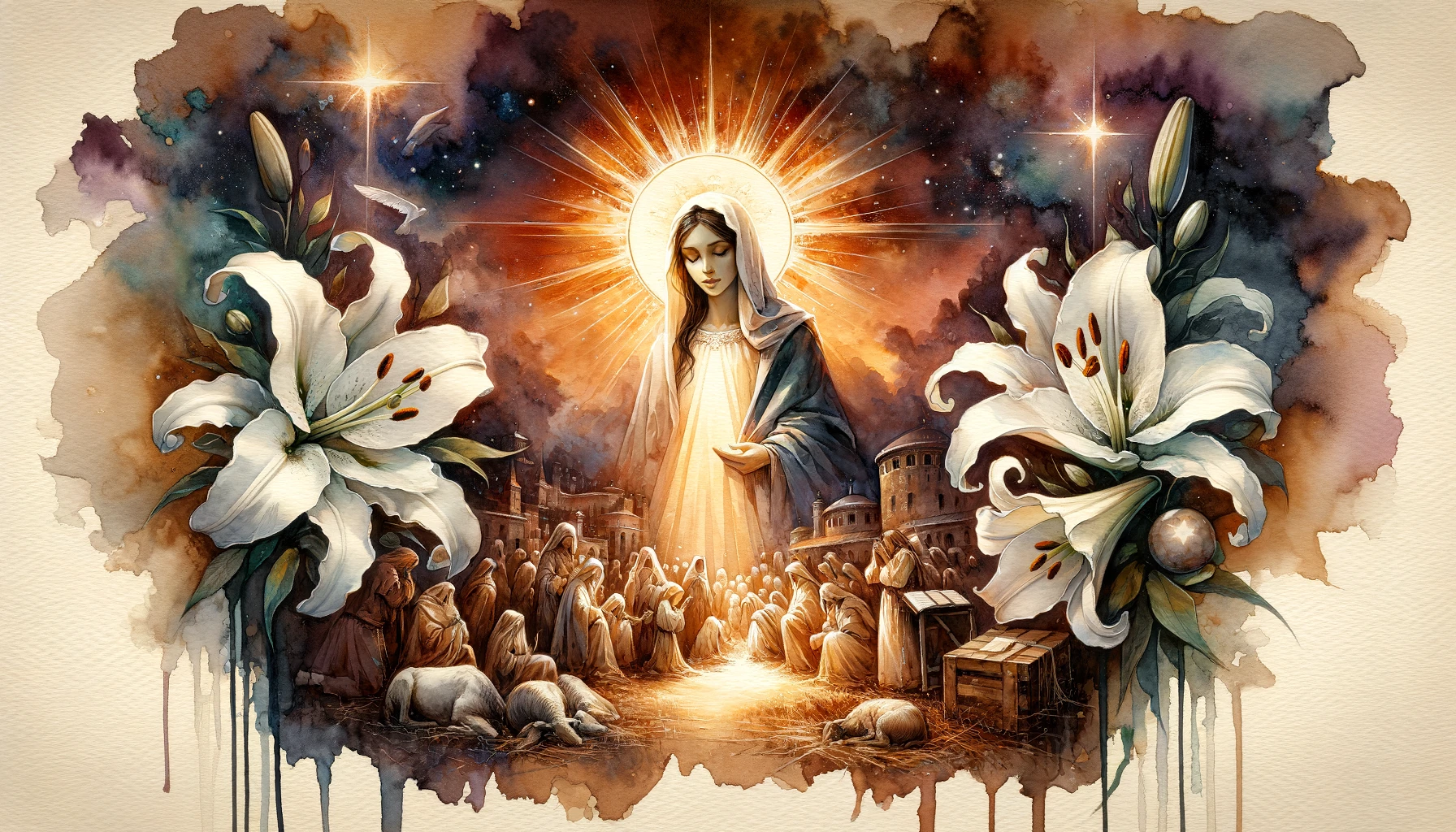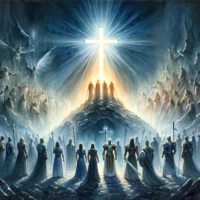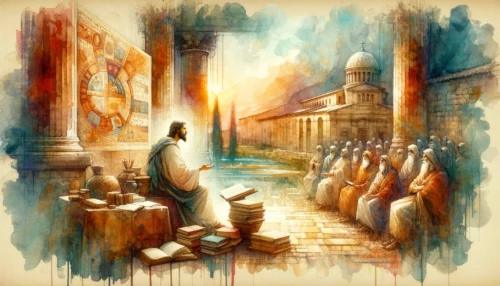The virgin birth is not just a miraculous event; it’s a profound declaration of God’s involvement in the world. This doctrine raises several intriguing questions: How does it affirm Jesus’ divinity and humanity? In what ways does it set Christianity apart from other faiths? And how does it impact our understanding of salvation and redemption? These questions invite us to consider the depth and breadth of the virgin birth’s significance, encouraging a deeper exploration of its implications for faith and life.
Theological Significance of the Virgin Birth
The virgin birth of Jesus Christ is a central tenet of Christian faith, underscoring the unique nature of Jesus as both fully divine and fully human. This doctrine affirms that Jesus was born to Mary, who was a virgin at the time of His birth, through the power of the Holy Spirit. This miraculous event is not merely a testament to the supernatural but also serves as a vital foundation for understanding the identity and mission of Jesus.
At the heart of the virgin birth is the affirmation of Jesus’ divinity. The intervention of the Holy Spirit in His conception establishes His origin from God, setting Him apart from all other human beings. This divine conception signifies that Jesus is the Son of God in a literal sense, sharing in the divine nature. It is through this miraculous beginning that Jesus embodies the perfect union of divinity and humanity, enabling Him to act as the mediator between God and man.
The virgin birth also fulfills Old Testament prophecies, signaling that Jesus is the long-awaited Messiah. The prophets spoke of a virgin giving birth to a son who would be called Immanuel, meaning “God with us” (Isaiah 7:14). This prophecy highlights the incarnation, the act of God taking on human flesh, as a pivotal event in salvation history. By being born of a virgin, Jesus fulfills these prophecies, confirming His identity as the Messiah and underscoring the faithfulness of God to His promises.
In addition, the virgin birth sets the stage for the sinless life of Jesus. According to Christian doctrine, sin is transmitted through the human line, but Jesus, being conceived by the Holy Spirit, is exempt from this transmission of sin. This exemption is crucial for His role as the sinless sacrifice for humanity’s sins. Only a sinless individual could bear the sins of the world, making the virgin birth essential for the efficacy of the atonement.
The virgin birth also challenges humanity’s expectations about God’s intervention in the world. It reveals a God who operates beyond the confines of natural law, affirming His sovereignty and power. This event invites believers to embrace a faith that transcends human understanding, encouraging trust in God’s mysterious ways.
The doctrine encourages deep reflection on the nature of Jesus’ mission. It was necessary for Jesus to be born in this miraculous manner to fulfill His role as Savior. His unique conception and birth testify to His purpose on earth—to bridge the gap between humanity and God, offering salvation to all who believe in Him.
The virgin birth is fundamental in Christian theology, affirming Jesus’ divine nature and fulfilling Old Testament prophecies. It underscores the unique identity of Jesus as fully divine and fully human, necessary for His role as the mediator between God and humanity. This doctrine highlights the sinless nature of Christ, essential for His sacrificial role in atonement, and challenges believers to embrace a faith that acknowledges God’s sovereignty beyond human comprehension. Through the virgin birth, the deep connection between divine prophecy, the nature of Jesus’ mission, and the faithfulness of God’s promises to humanity is revealed.
Historical and Prophetic Context of the Virgin Birth
The virgin birth of Jesus Christ is deeply rooted in the historical and prophetic traditions of the Bible, serving as a fulfillment of ancient prophecies and a manifestation of God’s plan for salvation. This event is not an isolated miracle but a pivotal moment that connects the Old and New Testaments, demonstrating God’s ongoing involvement in human history.
The prophecy of a virgin birth originates in the Old Testament, where Isaiah foretells the birth of a child to a virgin, a sign from God Himself (Isaiah 7:14). This prophecy was given at a time of great uncertainty and turmoil for the House of David, serving as a divine assurance of God’s continued presence and protection. The fulfillment of this prophecy in the New Testament through the birth of Jesus to Mary, a virgin, signifies the arrival of the Messiah, who has come to save His people.
This connection between the Old and New Testaments highlights the consistency of God’s salvation plan throughout history. The virgin birth acts as a bridge, linking the promises made to Abraham, Isaac, and Jacob with their fulfillment in Jesus Christ. It confirms the faithfulness of God to His covenant, showing that God’s promises are not bound by time but are eternally reliable.
The virgin birth is situated within the broader narrative of God’s redemptive history. It marks the beginning of the fulfillment of God’s promise to bring redemption and restoration to a fallen world. The entrance of Jesus into the world through the virgin birth signifies the inauguration of the new covenant, under which humanity can be reconciled to God.
The prophetic significance of the virgin birth extends beyond the fulfillment of ancient prophecies to its implications for the identity of Jesus. By being born of a virgin, Jesus is identified as the Son of God, endowed with divine authority and power. This unique birth sets Him apart from all other prophets and kings, affirming His position as the ultimate revelation of God to humanity.
The historical and prophetic context of the virgin birth also underscores the mystery of the incarnation. It reveals a God who chooses to engage with humanity in a deeply personal way, entering into the very fabric of human existence to redeem it from within. This act of divine humility and love is at the core of the Christian faith, offering hope and salvation to all who believe.
The virgin birth of Jesus Christ is a fulfillment of Old Testament prophecies and a key component of God’s salvation plan, bridging the gap between the promises made to the forefathers and their fulfillment in the New Testament. It confirms God’s faithfulness to His covenant and marks the beginning of the new covenant, under which humanity is offered reconciliation and redemption. The historical and prophetic context of the virgin birth emphasizes the unique identity of Jesus as the Son of God and the savior of the world, highlighting the incarnation as a divine act of love and humility.
Implications of the Virgin Birth for Christian Doctrine and Life
The virgin birth of Jesus Christ has profound implications for Christian doctrine and the everyday life of believers. This foundational event is not only a cornerstone of Christian faith but also shapes the understanding of who Jesus is, the nature of salvation, and how Christians are called to live in response to this truth.
The doctrine of the virgin birth affirms the sinless nature of Jesus, making Him the only person capable of serving as the perfect sacrifice for the sins of humanity. According to Christian belief, sin entered the world through Adam, and all human beings inherit this sinful nature. However, because Jesus was conceived by the Holy Spirit, He was born without the stain of original sin (Romans 5:12-19). This sinless life was essential for Jesus’ role as the atoning sacrifice on the cross, offering redemption and reconciliation between God and humanity.
The virgin birth underscores the incarnation, the belief that God became flesh and dwelt among us. This mystery reveals a God who is not distant or detached but one who enters into human experience, sharing in our joys, sorrows, and sufferings. The incarnation, initiated by the virgin birth, demonstrates God’s profound love and commitment to His creation, inviting believers to experience a personal relationship with Him.
The implications of the virgin birth extend to the identity and mission of the Church. As the body of Christ on earth, the Church is called to reflect the incarnation in its ministry, embodying God’s love and presence in the world. This mission involves reaching out to the marginalized, caring for the poor, and proclaiming the message of salvation and hope found in Jesus Christ.
In the personal lives of believers, the virgin birth serves as a model of faith and obedience. Mary’s acceptance of her role in God’s plan illustrates trust in God’s promises, despite the potential for misunderstanding and hardship. Believers are encouraged to emulate Mary’s faithfulness, trusting in God’s guidance and provision in their own lives.
The virgin birth also challenges Christians to embrace the supernatural aspects of their faith. It is a reminder that Christianity is rooted in the belief in a God who acts in history in ways that defy human logic and understanding. This aspect of faith encourages believers to live with a sense of wonder and openness to the miraculous, seeing God’s hand at work in both the extraordinary and the ordinary moments of life.
The virgin birth is central to Christian doctrine, affirming Jesus’ sinless nature and His role as the perfect sacrifice for sin. It highlights the incarnation, showing God’s love and desire for a personal relationship with humanity. For the Church and individual believers, it models faith, obedience, and a commitment to embodying God’s presence in the world. This doctrine also invites Christians to embrace the supernatural, fostering a faith that is alive with wonder and expectancy for God’s action in their lives.
The Heart of Our Salvation Story
The virgin birth of Jesus Christ is more than a miraculous event; it is the bedrock upon which the Christian faith is built. This divine act signals God’s direct intervention in human history, offering salvation through Jesus. It affirms the unique nature of Christ as fully divine and fully human, bridging the gap between God and humanity. The virgin birth shapes our understanding of sin, redemption, and the incarnation, inviting us to live lives marked by faith, obedience, and a deep relationship with God. It challenges us to see beyond the natural, embracing a faith filled with the expectation of God’s continuing work in the world.
Key takeaways:
- The virgin birth underscores Jesus’ divine nature and his sinless life, making him the perfect sacrifice for humanity’s sins.
- It fulfills Old Testament prophecies, demonstrating God’s faithfulness and the continuity of His salvation plan.
- The virgin birth invites believers to embrace a personal relationship with God, characterized by faith and obedience.
Reflecting on the Miracle
- How does the virgin birth deepen your understanding of Jesus’ identity and mission?
- In what ways can the virgin birth inspire your daily walk of faith?
- How can the Church better embody the incarnation in its ministry and outreach?
Let the miracle of the virgin birth inspire us to live with renewed faith and hope. In a world that often seeks natural explanations for everything, may we be people who cherish the supernatural aspects of our faith, seeing God’s hand at work in our lives and in the world around us. This foundational doctrine reminds us that with God, all things are possible, encouraging us to expect the extraordinary in our journey with Him.














